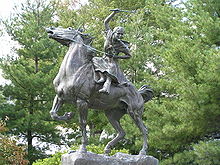 With the 4th of July on the horizon, I recently ran across an interesting Revolutionary War story. Everyone remembers Paul Revere and his “midnight ride” in April, 1775, but Revere was only one of a number of riders, and he was captured. Such are the vagaries of history.
With the 4th of July on the horizon, I recently ran across an interesting Revolutionary War story. Everyone remembers Paul Revere and his “midnight ride” in April, 1775, but Revere was only one of a number of riders, and he was captured. Such are the vagaries of history.
I know history is much more complicated. Some claim there was a female equivalent to Revere. According to this version, the British army was marching on Danbury, Connecticut in the spring of 1777 to capture a Continental army supply depot. A messenger rushed to warn the commander of the local militia in Patterson, New York, of the threat. That commander was Col. Henry Ludington, a veteran of the French and Indian War, and he immediately sent his 16-year old daughter Sybil on a 40-mile ride to Danbury and points in between to gather the militia. Although Danbury couldn’t be saved, the distance covered was more than twice Revere’s ride and Sybil’s feat is remembered by statuary in Carmel, New York, a postage stamp, and an ultramarathon.
Sybil’s ride makes a great story, especially for feminists, but is it true? The first written record doesn’t appear until 1880, in a history of New York City written by Martha J. Lamb, who apparently knew the family. This documentation gap of over a hundred years has led some to question the story’s authenticity.
But Sybil’s feat is completely plausible. Henry and Abigail Ludington did have a daughter who was 16 when the British burned Danbury, and horseback messengers were a common form of communication. And even if the story is apocryphal, it points to our need for heroes. Patriotic qualities are necessary in both men and women, and this is an example of an ordinary person stepping up and doing all she could in time of crisis.
And it is a really good story.
Information for this piece came from “The Incredible Tale of the Female Paul Revere” by Jack Doyle (http://www.ozy.com/flashback/the-incredible-tale-of-the-female-paul-revere/71415? ), and “Sybil Ludington” on Wikipedia ( https://en.wikipedia.org/wiki/Sybil_Ludington).
